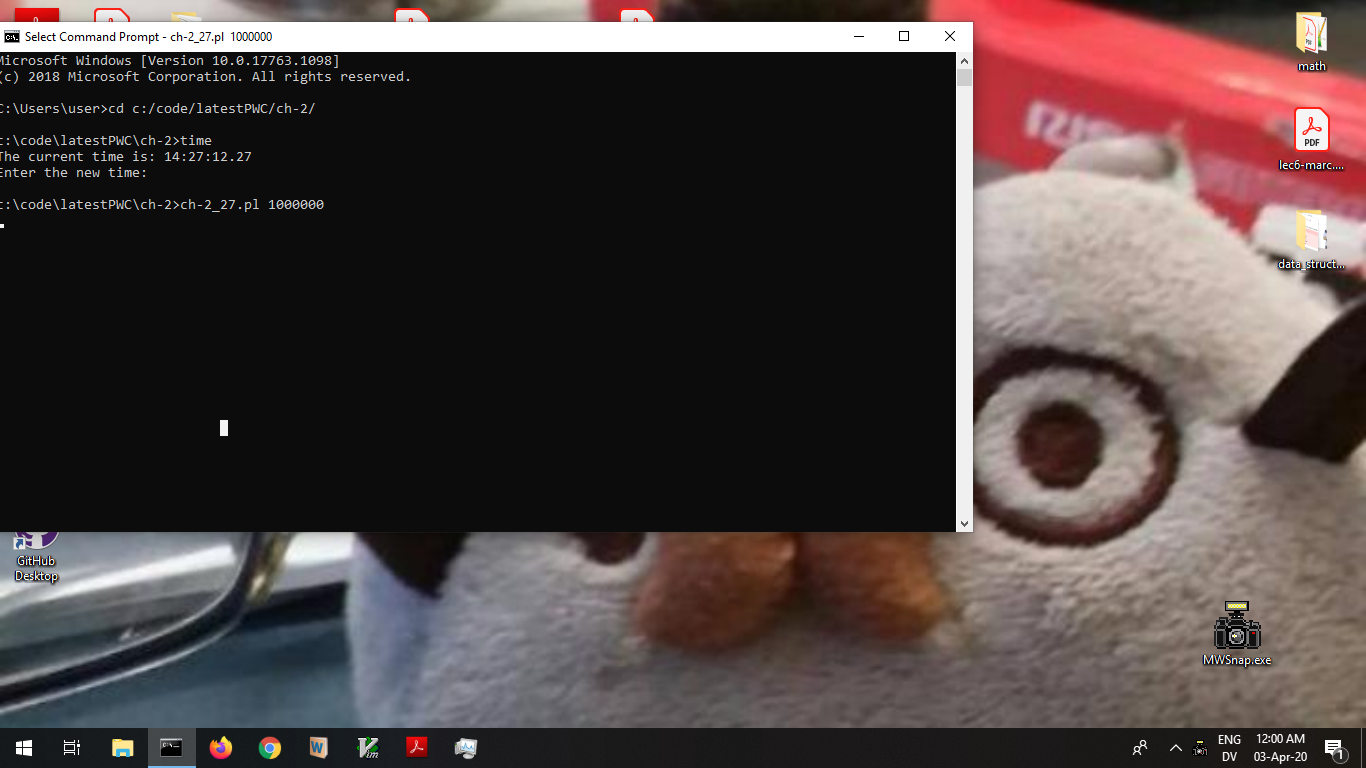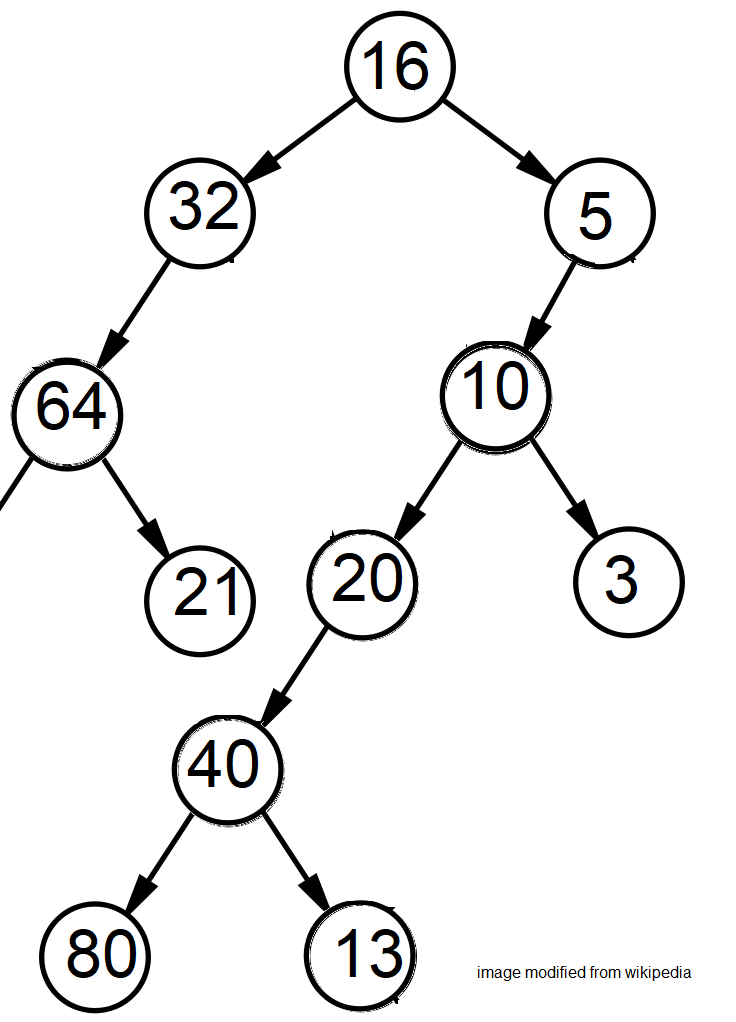CY's take on Perl Weekly Challenge #057
This is a part of Perl Weekly Challenge(PWC) #057 and the followings are related to my solution.
Do tell me if I am wrong or you strongly oppose my statements!
Task 1: Invert Tree
There is a module Tree::Binary on CPAN and its method "mirror" does what exactly describe in the Task 1. Of course, the experience of using a shortcut won't be filled a blog post.
Last week (PWC #056) I did not attempt the binary tree task but I did read the blogs of other PWC members.
Hence, it's time for my "blog report". Blog posts I use as reference are
- https://ry.ca/2020/04/path-sum/
- https://raku-musings.com/diff-sum.html
- https://blogs.perl.org/users/laurent_r/2020/04/perl-weekly-challenge-56-diff-k-and-path-sum.html
Discovered from reading, one of the ways of representing a binary tree which I hadn't thought of but very intuitive, is putting the nodes row by row!
Just like this:
( [5], [4,8], [11, 14, 13, 9],
[7, 2, 141, 142, 6, 5, 5, 1] );
Using this representation, it is very easy to invert the tree. Just swap the elements.
sub swaprowformtree {
my @btree = @_;
my $N = $#btree;
for my $i (1..$N) {
for my $j (0..2**($i-1)-1) {
($btree[$i][$j], $btree[$i][2**($i)-1-$j])
= ($btree[$i][2**($i)-1-$j], $btree[$i][$j]);
}
}
return @btree;
}
(May I name this "row form" of binary tree representation.)
The two most common ways are using nested array and using nested hash. I have implemented the nested array form.
The details of scripting is, again, transformation and reverse transformation!
To be lazy, I use Data::Dumper to output the binary tree:
use Data::Dumper;
...
$Data::Dumper::Terse = 1;
$Data::Dumper::Indent = 0;
print Dumper rowform_transform_array swaprowformtree @ro_tree1;
where @ro_tree1 is the product of these codes:
my @ro_tree1;
sub array_transform_rowform {
my ($h, $val, @kids) = @_;
if (! defined(@ro_tree1[$h])) {
@{$ro_tree1[$h]} = ();
}
push @{$ro_tree1[$h]}, $val;
if ($kids[0]) {
my ($temp, @smallkids) = @{kids[0]};
array_transform_rowform($h+1, shift @{$kids[0]}, @{$kids[0]});
}
if ($kids[1]) {
my ($temp, @smallkids) = @{kids[1]};
array_transform_rowform($h+1, shift @{$kids[1]}, @{$kids[1]});
}
}
Actually the transformations between nested array and row form is the most difficult part of the coding for me this week.
sub rowform_transform_array {
my @rowform = @_;
my $height = $#rowform;
my @data = ();
for (0..2**$height-1) { push @data, [ $rowform[$height][$_] ]; }
for my $i (reverse 1..$height-1) {
my @newdata = ();
for my $j (0..2**$i-1) {
$newdata[$j] = CombineTwo($data[$j*2], $data[$j*2+1]);
unshift @{$newdata[$j]}, $rowform[$i][$j];
}
for my $j (0..2**($i-1)) {$data[$j] = $newdata[$j];}
}
return [$rowform[0][0], $data[0], $data[1]] ;
}
sub CombineTwo {
my @temp = ($_[0], $_[1]);
return \@temp;
}
I would like to implement the nested hash if I had more spare time.
Task 2: Shortest Unique Prefix
With sorting, this task doesn't seem difficult, so I try on it.
This is my first time to use dualvar in Scalar::Util. It is quite a funny construct. I use it to keep the order of the provided list.
Its official description is: " my $var = dualvar( $num, $string ); # Returns a scalar that has the value $num in a numeric context and the value $string in a string context." [source] The funny thing about it is we ask for its numeric value by $var+0, and ask for its string value by "$var".
There should be many ways and tricks on manipulations sorting on hashes. As a dessert of the post, visit Tutorial section of Perl Monks I read today and see the trick of "||" with uc($a) cmp uc($b), written by Our Respected davido in 2003. (Being extraordinarily formal seems like the culture of PM; unable to follow yet.) Time for the end of this blog.
Stay healthy and alert! □
My code can be found in GitHub.



 This blog is inactive and replaced by https://e7-87-83.github.io/coding/blog.html ; but I post highly Perl-related posts here.
This blog is inactive and replaced by https://e7-87-83.github.io/coding/blog.html ; but I post highly Perl-related posts here.